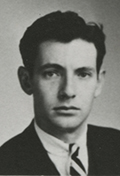John Jay Hooker Jr. ’57, an attorney, businessman and candidate for governor of Tennessee, died Sunday, Jan. 24, after a battle with metastatic myeloma. Following his diagnosis in January 2015, Hooker began the last campaign of his life: the passage of a “death with dignity” law similar to that passed in Oregon.
An attorney and entrepreneur, Hooker was a member of the storied Vanderbilt Law Class of 1957, whose graduates included prominent trial attorney and Watergate prosecutor Jim Neal, civil rights attorney George Barrett, Judge Thomas Higgins of the Middle District of Tennessee, former Nashville District Attorney and Tennessee Criminal Court Judge Thomas Shriver, former Federal Communications Commission Chairman William Henry, and former prosecutor and prominent Nashville attorney John Hollins Sr. (BA’55) .
Hooker had been honored as “Tennessean of the Year” by The Tennessean, Nashville’s daily newspaper, in 2015.
John Jay Hooker named “Tennessean of the Year”
Read the New York Times obituary.
Read the WPLN-Nashville Public Radio obituary.
Read The Tennessean’s obituary.
He was a two-time Democratic nominee for governor of Tennessee and again ran for governor as an independent candidate in 2014. He also ran for the U.S. Senate twice and for the U.S. House of Representatives once.
A graduate of Sewanee, The University of the South, Hooker earned his law degree after serving for two years as an investigator in the U.S. Army Judge Advocate Corps from 1952 to 1954.
 After law school, he practiced with his father’s law firm, Hooker Keeble Dotson and Harris, from 1957 to 1960, and then formed Hooker Hooker and Willis with his brother, Henry Hooker, and William R. (Bill) Willis Jr. ’54.
After law school, he practiced with his father’s law firm, Hooker Keeble Dotson and Harris, from 1957 to 1960, and then formed Hooker Hooker and Willis with his brother, Henry Hooker, and William R. (Bill) Willis Jr. ’54.
In 1958, Hooker was asked by Tennessee Gov. Frank Clement to join a legal team investigating Judge Raulston Schoolfield of Chattanooga on corruption charges. Schoolfield was accused of accepting an $18,500 bribe from the Teamsters union to fix a case that came before him on the Hamilton County Criminal Court and was ultimately disbarred and removed from the bench as a county judge. One of the witnesses testifying against Schoolfield was Bobby Kennedy, who was then serving as a counsel to a U.S. Senate committee investigating union corruption.
When Kennedy missed his plane to Washington, D.C., and was forced to spend an unplanned night in Nashville, Hooker volunteered to give him a tour of the Hermitage. “By the time he left, we were pals,” Hooker recently told WPLN reporter Chas Sisk.
Hooker served as a special assistant to Attorney General Kennedy from 1961 to 1963, living with the Kennedy family during his two years in Washington. He was instrumental in the U.S. Justice Department’s intervention in the case of Baker v. Carr, which became a landmark Supreme Court case that enabled federal courts to decide redistricting cases. The case, brought by Memphis Mayor Charles Baker in 1960 against the State of Tennessee and its Secretary of State, Joe Carr, addressed redistricting. The Supreme Court’s decision, handed down in 1962, established the “one person, one vote” standard, which required that state districts be based on population rather than geographic boundaries.
Kennedy encouraged Hooker to run for governor in 1966, but Hooker’s strong support for civil rights and high regard for Martin Luther King Jr.—unpopular positions in Tennessee at that time—resulted in a decisive defeat in the primary.
Hooker was Tennessee’s Democratic nominee for governor in 1970, but lost to Republican Winfield Dunn, who later became a lifelong friend.
Hooker launched the Minnie Pearl Fried Chicken chain in 1967. A federal investigation of the company’s bookkeeping coincided with his unsuccessful gubernatorial campaign.
He served as president of STP Corp. (1973-1976); as publisher of the Nashville Banner, the city’s afternoon newspaper, from (1979-1982), and as chair of United Press International from (1982-1983).
Hooker is survived by four children.
A memorial service and family visitation will be held at 1 p.m. Saturday, Feb. 6, in the Grand Reading Room of the downtown Nashville Public Library at 615 Church Street.